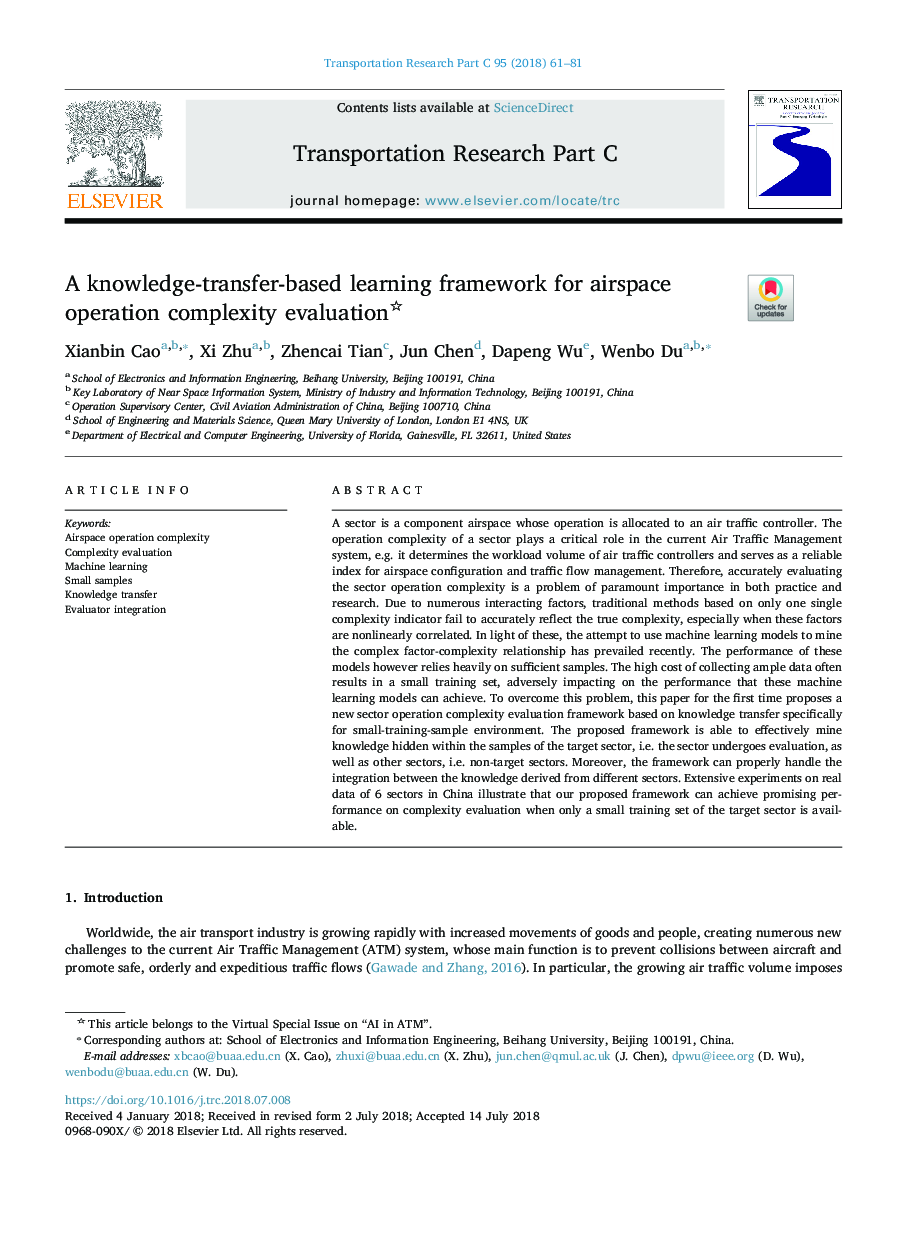| کد مقاله | کد نشریه | سال انتشار | مقاله انگلیسی | نسخه تمام متن |
|---|---|---|---|---|
| 6935640 | 1449654 | 2018 | 21 صفحه PDF | دانلود رایگان |
عنوان انگلیسی مقاله ISI
A knowledge-transfer-based learning framework for airspace operation complexity evaluation
ترجمه فارسی عنوان
یک چارچوب یادگیری بر مبنای انتقال دانش برای ارزیابی پیچیدگی عملیات هوایی
دانلود مقاله + سفارش ترجمه
دانلود مقاله ISI انگلیسی
رایگان برای ایرانیان
کلمات کلیدی
پیچیدگی عملیات هوایی، ارزیابی پیچیدگی، فراگیری ماشین، نمونه های کوچک، انتقال دانش، ادغام ارزیاب،
ترجمه چکیده
یک بخش هواپیما جزء است که عملیات آن به کنترل ترافیک هوایی اختصاص داده شده است. پیچیدگی عملیات یک بخش نقش حیاتی در سیستم مدیریت ترافیک هوایی فعلی دارد، مثلا این حجم حجم کار کنترل کننده های ترافیک هوایی را تعیین می کند و به عنوان یک شاخص معتبر برای تنظیم پیکربندی هوا و مدیریت جریان ترافیک عمل می کند. بنابراین، با دقت ارزیابی پیچیدگی عملیات بخش، مسئله اهمیت فوق العاده در هر دو تمرین و تحقیق است. با توجه به عوامل متعدد تعامل، روش های سنتی مبتنی بر تنها یک شاخص پیچیدگی تک، به درستی نشان دهنده پیچیدگی واقعی است، به ویژه هنگامی که این عوامل به طور غیر خطی همبستگی دارند. با توجه به این، تلاش برای استفاده از مدل های یادگیری ماشین برای به دست آوردن رابطه پیچیده عامل پیچیده اخیرا به نفع خود بوده است. عملکرد این مدلها به شدت بر نمونه های کافی تأثیر می گذارد. هزینه بالای جمع آوری داده های فراوانی اغلب به یک مجموعه آموزشی کوچک کمک می کند که به طور ناخودآگاه بر عملکردی که این مدل های یادگیری ماشین می تواند انجام دهد، تاثیر می گذارد. برای غلبه بر این مشکل، این مقاله برای اولین بار یک چارچوب ارزیابی پیچیدگی عملیاتی بخش جدید را بر مبنای انتقال دانش به طور خاص برای محیط نمونه کوچک آموزش پیشنهاد می دهد. چارچوب پیشنهادی قادر است به طور مؤثری دانش را پنهان در نمونه های بخش هدف، یعنی بخش تحت ارزیابی، و نیز سایر بخش ها، یعنی بخش های غیر هدف قرار دهد. علاوه بر این، چارچوب به درستی می تواند ادغام بین دانش حاصل از بخش های مختلف را اداره کند. آزمایش های گسترده ای بر روی داده های واقعی 6 بخش در چین نشان می دهد که چارچوب پیشنهادی ما می تواند عملکرد قابل ملاحظه ای را در ارزیابی پیچیدگی به دست آورد که تنها یک مجموعه آموزشی کوچک از بخش هدف موجود است.
موضوعات مرتبط
مهندسی و علوم پایه
مهندسی کامپیوتر
نرم افزارهای علوم کامپیوتر
چکیده انگلیسی
A sector is a component airspace whose operation is allocated to an air traffic controller. The operation complexity of a sector plays a critical role in the current Air Traffic Management system, e.g. it determines the workload volume of air traffic controllers and serves as a reliable index for airspace configuration and traffic flow management. Therefore, accurately evaluating the sector operation complexity is a problem of paramount importance in both practice and research. Due to numerous interacting factors, traditional methods based on only one single complexity indicator fail to accurately reflect the true complexity, especially when these factors are nonlinearly correlated. In light of these, the attempt to use machine learning models to mine the complex factor-complexity relationship has prevailed recently. The performance of these models however relies heavily on sufficient samples. The high cost of collecting ample data often results in a small training set, adversely impacting on the performance that these machine learning models can achieve. To overcome this problem, this paper for the first time proposes a new sector operation complexity evaluation framework based on knowledge transfer specifically for small-training-sample environment. The proposed framework is able to effectively mine knowledge hidden within the samples of the target sector, i.e. the sector undergoes evaluation, as well as other sectors, i.e. non-target sectors. Moreover, the framework can properly handle the integration between the knowledge derived from different sectors. Extensive experiments on real data of 6 sectors in China illustrate that our proposed framework can achieve promising performance on complexity evaluation when only a small training set of the target sector is available.
ناشر
Database: Elsevier - ScienceDirect (ساینس دایرکت)
Journal: Transportation Research Part C: Emerging Technologies - Volume 95, October 2018, Pages 61-81
Journal: Transportation Research Part C: Emerging Technologies - Volume 95, October 2018, Pages 61-81
نویسندگان
Xianbin Cao, Xi Zhu, Zhencai Tian, Jun Chen, Dapeng Wu, Wenbo Du,
